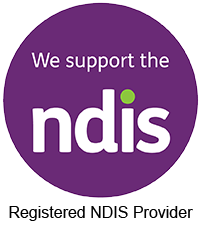The role of an occupational therapist is to work with people to help them achieve a fulfilled and satisfied state in life through the use of “purposeful activity or interventions designed to achieve functional outcomes which promote health, prevent injury or disability and which develop, improve, sustain or restore the highest possible level of independence.

FAQ
01. WHAT IS AN OCCUPATIONAL THERAPIST?
02. HOW DO I KNOW IF I NEED OCCUPATIONAL THERAPY?
Clients become aware of their occupational therapy needs once they begin to experience difficulties in any area of daily living as a result of physical and/or mental health difficulties. Sometimes some of our clients have been advised to consult an occupational therapist by a school teacher, Paediatrician, GP, NDIS planner or Psychologist.
03. WHAT IS A SPEECH PATHOLOGIST?
Speech pathologists study, diagnose and treat communication disorders, including difficulties with speech, language, social communication, swallowing, fluency and voice. They work with people who have difficulty communicating because of developmental delays, stroke, brain injuries, learning disability, intellectual disability, cerebral palsy, dementia and hearing loss, as well as other problems that can affect speech and language. People who experience difficulties swallowing food and drink safely can also be helped by a speech pathologist.
04. HOW DO I KNOW IF I NEED SPEECH PATHOLOGY?
If you have been advised to see a speech pathologist or you think you can benifit from speech pathology and you want to know more if we can help, get in contact with any questions you may have and we will determine if you require speech therapy.
05. WHAT HAPPENS IN THE FIRST APPOINTMENT?
The initial assessment will usually last 60 minutes and is used to determine issues that you or your child may be having, gather important information and complete standardised and non standardised assessments. Following the information gathering stage, we will then work with you to set realistic, achievable and timely goals. A report following initial assessment is optional.
06. DO YOU DO SCHOOL / HOME VISITS?
Yes we do. Extra fees apply for consultations in the community and associated travel.
07. DO YOU DO BULK BILL FOR MEDICARE CLAIMS?
No we don’t. We hope to offer this in the near future.
08. DO YOU DO SKYPE CONSULTATIONS?
Yes we do. Please get in contact to organise prior to booking. You can get Skype here.
09. DO YOU HAVE A WAITING PERIOD?
Our maximum wait time is usually no longer than a week. we do our best to accommodate new clients as soon as possible to avoid long waiting periods.
10. DO I NEED A REFERRAL?
No, you don’t. Get in contact with us to arrange an appointment.
12. WHAT TRAINING DO SPEECH PATHOLOGISTS NEED?
All speech pathologist complete a university qualification. Speech Pathology Australia is recognised by the Department of Education and Training as the assessing authority for speech pathologists in Australia.
The Association accredits university programs that offer speech pathology training. Currently, speech pathologists are able to gain a recognised qualification at either an undergraduate or Masters level. Both courses are equally recognised by the Association and employers. Learn more about qualifications with the Association’s Position Statement on Dual Entry to the Speech Pathology Profession.
Speech pathology is a self-regulated profession. Members must meet the Association’s standards in regards to continuing professional development in order to renew as a Certified Practising Speech Pathology Australia member.
13. WHAT IS THE DIFFERENCE BETWEEN PUBLIC AND PRIVATE SPEECH PATHOLOGISTS?
Speech pathologists can work in public and private settings.
Public services are provided by government or not for profit organisations. The service is usually free of charge though sometimes a small fee may be charged. There is often a waiting list for public services.
Private services are provided by speech pathologists working in a sole practice, with other speech pathologists or in multi-disciplinary practices. There is a fee for these services though rebates through Medicare and private health insurance may be available. Usually, you do not need a referral to see a speech pathologist. You will need to visit a GP if you need to be assessed for eligibility for Medicare rebates through the Chronic Disease Management program.

